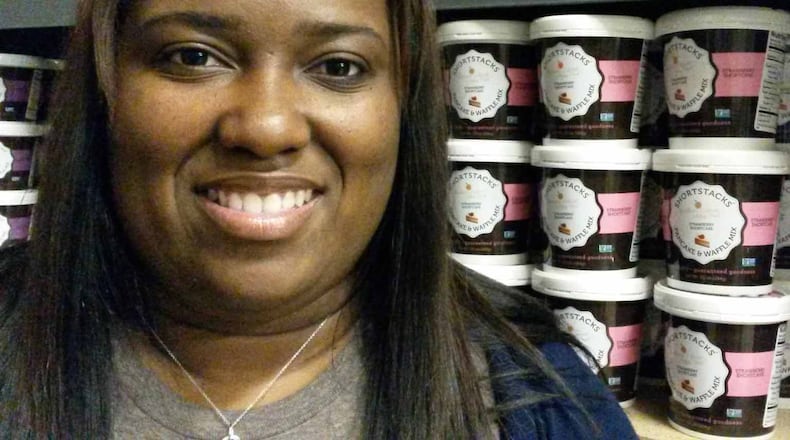SECRETS OF SUCCESS
ENTREPRENEURS SHARE WHAT THEY’VE LEARNED
INSPIRING PERSPECTIVES
Each Sunday, the AJC brings you insights from metro Atlanta’s leaders and entrepreneurs. Matt Kempner’s “Secrets of Success” shares the vision and realities of entrepreneurs who started their dreams from scratch. The column alternates with Henry Unger’s “5 Questions for the Boss,” which reveals the lessons learned by CEOs of the area’s major companies and organizations.
Find previous columns from Unger and Kempner on our premium website for subscribers at www.myajc.com/business.
Barrett’s tips for food entrepreneurs:
— Do something different. Use that to explain to retailers why they should carry your product.
— Pay attention to packaging and design. Retailers look at the packaging first. Only later do they ask for samples to taste.
— Food margins can be low. Understand what it costs to make your product, including labor.
— Never give up. Every entrepreneur asks: “Can I do this? How do I bounce back?”
Southern Culture Artisan Foods
Based in Decatur.
Launched in 2012.
Erica Barrett, 32-year-old founder and 100-percent owner.
Annual revenue: $508,000 last year. Projecting at least $1 million this year.
Profit margin: Broke even last year.
Business: Southern Culture Artisan Foods makes a series of breakfast foods, including creative pancake mixes, that are sold online and in small and large retailers, including some Safeway, Kroger, Harris Teeter and Whole Foods stores.
Staff: four full-time employees including Barrett’s mother-in-law, as well as three part-time workers.
Barrett’s pay: $30,000 last year, her first to consistently pay herself.
His hours: About 105 hours a week.
More information about launching and running a small business is available from the state of Georgia at: http://www.georgia.org/small-business/
“I was like, ‘How hard can it be to get in a farmers market?’ I felt like a failure.”
“I had that aha moment: I can create something. I can totally reinvent the breakfast experience…. I left that store an entrepreneur in my head.”
She knew she wanted to be an entrepreneur. But how much failure could one Decatur woman take on the way to building what she hoped would become a breakfast food empire?
It seemed everyone told Erica Barrett no. Yet now, the 32-year-old with no formal culinary education is selling her line of creative pancake mixes and other breakfast foods at gourmet stores and big retailers nationwide. She’s even done a stint on ABC TV’s hit show Shark Tank.
Barrett said she and her four full-time employees (including her mother-in-law), generated just over $500,000 in revenue last year, and she hopes her Southern Culture Artisan Foods will double that this year, though progress has been slower than she expected.
For two and half years I made the batches for the orders. I finally brought on a professional baker. I wish I had done it from the beginning. That’s part of being an entrepreneur: It’s hard to let go of those things. You don’t want to anybody to know your recipe. Everybody thinks that someone wants their idea. It’s not true.
I’ve been cooking since I was nine. And I’ve always had a love for food.
After graduating college with a business degree, she worked as a Target manager and then as a payroll company’s HR consultant for small and mid size business clients.
It was a great career. How often can you work from home, make close to six figures in your late 20s and keep your schedule? But I wasn’t happy. There were days I would cry. I knew there was more to life. I met all of those entrepreneurs and it made me want to have my own business.
Me and my husband talked about it. I said: “I’m going to come up with something.”
One day I was cooking, and I wanted to make pancakes from scratch. I get all these ingredients: pure cane sugar, organic flour, fresh strawberries. My bill was close $35. I wished I could have just grabbed a great pancake mix that had great fruit in it. I felt like I can got find these dinner options in the grocery store, but when I went to get something for breakfast, you could pick cereal or this boxed pancake mix that had no flavor.
I had that aha moment: I can create something. I can totally reinvent the breakfast experience and get this stuff to the grocery store. I left that store an entrepreneur in my head. I get home, and I started writing down my recipe.
I got obsessed trying to create this product. I started finding graphic design websites, looking up how to get nutritional labels. I would call flavoring companies. I was in in Whole Foods, and I’d see freeze dried bananas and strawberries. “Maybe I can use these and maybe I can use these organic cookies.” I spent a lot of money testing all this stuff out.
The goal was always to be a breakfast company. It’s just that all I could afford at the time was to create one product: pancakes. I started with three flavors: vanilla (pure vanilla beans sourced from Madagascar), banana pudding and bourbon salted pecan. The only rules I had was all natural, great tasting, non GMO. It just means that you have products that have no chemicals, no preservatives.
My job was bankrolling getting all these little project done.
I needed to come out with a bang. I had this Christmas launch party right in time for the holidays. I got my labels in, my designer had created everything. The labels didn’t fit. I had spent $2,000 on them. I was devastated. I had to push back launching. It wasn’t until four months later that I got new labels in.
I started applying to farmers markets around Atlanta. Everyone turned me down.
I was like, “How hard can it be to get in a farmers market?” I felt like a failure. If a farmers market won’t take me, a retailer sure wouldn’t.
I had applied for Shark Tank season four. Producers called me. They said you are way too early for Shark Tank. You don’t have any sales. Call us back for next season. I was crushed. I felt like I had something to prove.
She did get in a local food festival. In addition to picking up sales, a representative of America’s Mart was there and recruited her for a booth at a home and gift show attended by retailers.
It is either now or never. I bought some shelves. I printed some banners. I produced cases and cases of product to fill up the booth. It was $3,300. I took out a loan against my 401(k). I still didn’t have enough, so I asked my husband, can you give me some extra money to do this show? He said we will try this this one time, but if this doesn’t work you better not come to me with any more of your ideas.
We went to that show and it was totally life changing. We did $80,000. We picked up Nordstrom, T.J.Maxx, HomeGoods.
She also landed business with mom and pop stores, which, unlike big retailers, pay in advance for their orders.
The big stores are great, but they pay in 30 to 45 days. You could die waiting on that check. I realized there has to be a balance.
We are in this shared kitchen making product every night. Just me and my husband. I had struggled to stay in business. It is not easy to make payroll every two weeks. You have to know how to manage your cash. I really needed an investor, I thought.
She tried out again for Shark Tank and this time made it on the show, in which a panel of wealthy investors — the “sharks” — hears pitches from entrepreneurs and decides whether to fund them.
I got great feedback from the sharks. I didn’t get ripped apart. On the show we got an offer from Kevin O’Leary and Barbara Corcoran. I decided to take the deal with Barbara. It was $100,000 for 38 percent (of Barrett’s business). I wanted to do $100,000 for 25 percent.
The show aired. Over a month’s time we made $100,000 in revenue just from Shark Tank customers. That’s just online web sales. If I go to a retailer, it makes it so much easier to do a deal when somebody saw your face on Shark Tank.
But Corcoran never closed the investment deal made on the show, Barrett said.
The response I got was, “Hey, Erica, we won’t be able to do a deal with you at this time. On the show you said you had a potential deal with Target and Safeway, if you get those deals then we will revisit giving you the money.”
You have to have enough drive and passion and love for what you are doing that you keep going. So I kept going. Since that time I’ve found alternative financing, just a loan I pay back.
A lot of the big retail deals take years. Safeway took 18 months. It took four rejections. It look several (corporate) buyers before we got a “yes.”
I’m very fortunate. My husband makes really good money. We also live a very conservative lifestyle.
I always wanted to just do food. But now I’m the CEO of a company. I don’t know if that is the responsibility that I wanted. You have to learn how to run the business well. Employees come along with that. HR issues come along with that. Handling day-to-day issues that you may not be passionate about. I’m OK with that.
I absolutely love what I’m doing. It doesn’t feel like work.
About the Author
Keep Reading
The Latest
Featured




